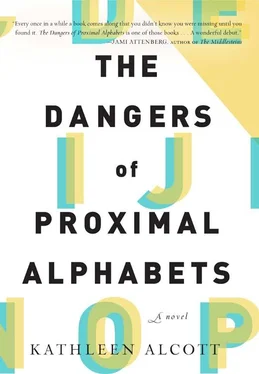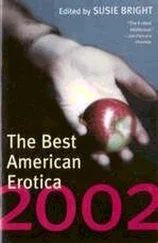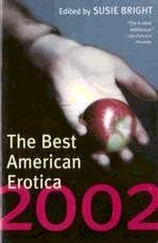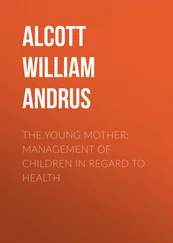“The … the …” James struggled from his sleep, clearly on the verge of a pressing communication.
“THE COWBOY SKITTLES.”
He lashed his head emphatically against the pillow, then reassumed inertia. I waited for Jackson’s reply, but it never came. I cast my head to the astronaut clock, which read 9:17, and watched as the digital numbers changed, the backward and upside-down L becoming two boxes that signified 8. At 9:20, James let out a sharp breath.
“All night,” Jackson said. “Gold.”
“Nightgold,” agreed James, his lips moving over his teeth between words. “All of it.”
The clarity faded. The sleeping words deteriorated into syllables, and the syllables were like marbles scattering, rolling away from the others only to collide again as if happening into the same groove on their shared surface. The effect was that of someone imitating a language he didn’t speak: it was nonsense that was grouped, punctuated.
“Ah za kneeth .” It sounded as if James was pleading.
“Kerr pree, puh hmz .”
“Miss-ing,” sighed Jackson. “Missing missing.”
“Missing,” echoed James.
“Girl not lady.”
“No-nowhere girl.”
Seeing my opportunity, I butted in.
“Anna?” I asked. And then, more insistently, “Anna?”
“Anna,” they breathed in unison.
“ Where ?” I demanded. “Where?”
“The man,” began Jackson,
“walks bad,” James asserted.
“Walks bad? Talks bad,” Jackson clarified.
And then, in the rhythm of Morse code or telegrams, forms of communication obsolete and so fascinating in their urgency:
“Anna — gone — man — walks so bad — hiding.”
I questioned Jackson the next day before school started. Had he had any dreams about Anna? None that he could remember, he said. And then, seeing the look on my face, his story changed: no, definitely not. But you said her name , I pleaded. He took his homework out of his backpack, put it on his desk, and looked up at the chalkboard. I was on my own.

As a little girl, I was normally comforted by mathematics, soothed by the premise of one true, right answer, but in the next few days the powdery white numerals against the dusty green were written, erased, rewritten, multiplied — and I hardly noticed. I also loved words — for an entirely different reason, for the way they lent themselves to endless combinations — but the spelling lists, also, I copied down with little interest and did not study later.
My father, like the rest of the parents, grew more distraught as the weeks went on and Anna never appeared. Except while the rest of them could almost believe the lies they told their children about it being only a matter of time before she was back helping her mother garden in the front yard, my father spent as much time as he could in the newsroom looking for the gruesome answer. He looked through pages and pages of local and surrounding areas’ sex offenders, he reviewed the police report although he knew it by heart already, he read crime logs from the past six months, then a year and two years, but it was futile.
I made sense of it because I had to, or at least that is what I tell myself when the man’s face appears in my memory: half paralyzed, something about the blue eyes sloppy but essentially kind. He was the janitor at the junior high school and sat almost every day at a sidewalk table of an Armenian café that served bottomless coffee, looking at nothing in particular and sometimes laughing rather convulsively at what the old men who also sat there said. Perhaps he had suffered a stroke at a relatively young age; he dragged the left side of his body dutifully, like an older brother chaperoning his younger sibling at the fair with effort, though not unhappily. He talked slowly and thickly and mumbled pleasantly to himself as he walked. Surely, I thought, he was the man who walked and talked bad that my sleeping friends had alluded to. Surely he had fallen in love with Anna as she breezily crossed the courtyard from fifth to sixth period, while he emptied the trash cans overflowing from the eighth graders’ lunch. Surely he was hiding her.
Although I am cursed with a memory that forgives very little, the series of events that followed appear in matter-of-fact captions in my brain. The absence of typical floridity seems to imply that there can be no forgiveness for what I did. While my father was still at work, likely also sweating in the search to bring back Anna and what she’d taken with her of our little community, I called the number listed on the flyer and felt a strange giddiness at an action so independent. It was similar to the times my father had let me sit in his lap and steer; although his feet were on the brakes, I was happy to reign over the full circle of leather.
I supplied his name. They asked how old I was but still seemed willing to listen. When they asked what proof I had, I lied, though I had not planned on it. I said I had heard him talking to himself in the magazine aisle of the bookstore, picking up a glossy thing meant for young female teens and saying, “Anna will like this.” It was a complex lie for someone so young to tell, and thinking about it now I am both impressed and disgusted.
They did not find the missing girl in his tiny in-law, but they did find cats. More than forty cats: some diseased, most inbred, of different colors, in different states of filth and malnutrition. The smell that occasionally came from the house, neighbors later reported, had been awful, but they’d had no idea about the animals. The cottage was far enough back from the street that the sound of the mournful, elongated meows and hissing had not reached the families eating quiet dinners, and the landlord reported that the man seemed friendly enough and always paid his modest rent on time. The footage of him on the news showed him in tears, and the papers reported him as dimwitted though remorseful. The number of cats had grown rapidly, from ten to seventeen in just a few months, and he had naïvely hoped he could love and take care of all of them. By the time the number had reached forty, the situation was long out of control, but he worried what would happen if he told anyone.
There were threats of charges and a slew of highly vocal animal rights activists, but in the end the former were dropped and the latter found causes less wilted and easier to chant slogans at than the lonely, possibly mentally disabled man who swept up thirteen-year-olds’ messes.
I had never done anything to incite such a rage in my father. His anger took a subdued form that seemed to sit and percolate, wishing to avoid explosions, only outwardly expressing itself in a cupboard shut just too forcefully, a phone gripped just beyond necessity. The men in badges had come and given me a serious talking to, my father nodding in solidarity with his hands clasped between his knees. When they gave a roundabout implication that maybe I’d done this for the reward, I burst into hot, ignoble tears. They looked at each other and stopped. It was clear they’d said enough. My father shook their hands at the door and apologized again, closed the door, and laid his head, briefly, upon its frame. He took a brisk route into the kitchen, where he made a sandwich and left the ingredients sitting out. He spent the rest of the afternoon in his bedroom, and I tried to keep busy. I teased our unresponsive cat and rode my bike around the block fast and without pleasure; it became evening and my father had still not surfaced.
I wanted badly to see James and Jackson, but they were spending the weekend with Julia’s mother in a dry, flat town four hours south. I was hungry. Though I was a reasonably autonomous girl and could easily have fixed myself something to eat, I did not. I reread part of a book about a brother and sister who run away to live in a museum and fell asleep with the light and all my clothes on, missing my mother fiercely.
Читать дальше













